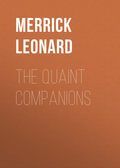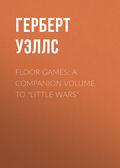
Герберт Джордж Уэллс
Certain Personal Matters
OF BLADES AND BLADERY
The Blade is not so much a culture as a temperament, and Bladery – if the thing may have the name – a code of sentiments rather than a ritual. It is the rococo school of behaviour, the flamboyant gentleman, the gargoyle life. The Blade is the tribute innocence pays to vice. He may look like a devil and belong to a church. And the clothing of the Blade, being symbolical, is a very important part of him. It must show not only a certain tastiness, but also decision in the accent, courage in the pattern, and a Dudley Hardihood of outline. A Blade must needs take the colour of his social standing, but all Blades have the same essential qualities. And all Blades have this quality, that they despise and contemn other Blades from the top downward. (But where the bottommost Blade comes no man can tell.)
A well-bred Blade – though he be a duke – tends to wear his hat tilted a little over the right eyebrow, and a piece of hair is pulled coquettishly down just below the brim. His collar is high, and a very large bow is worn slightly askew. This may be either cream-coloured or deep blue, with spots of white, or it may be red, or buff, but not green, because of badinage. The Blade of the middle class displays a fine gold watch-chain, and his jacket and vest may be of a rough black cloth or blue serge. The trousering may be of a suit with the jacket, or tasteful, and the shoes must be long. The betting man, adorned, is a perfect Blade. There is often a large and ornamental stick, which is invariably carried head downwards. And note, that the born Blade instinctively avoids any narrowness of pose. In walking he thrusts out his shoulders, elbows, and knees, and it is rather the thing to dominate a sphere of influence beyond this by swinging his stick. At first the beginner will find this weapon a little apt to slip from the hand and cause inconvenience to the general public; but he must not mind that. After a few such misadventures he will acquire dexterity.
All Blades smoke – publicly at least. To smoke a white meerschaum in the streets, however, is very inferior form. The proper smoking is a briar, and, remember, it is not smart to have a new pipe. So soon as he buys it, the Blade takes his pipe home, puts it on a glowing fire to burn the rim, scrapes this away, burns it again, and so on until it looks a sullen desperado of a pipe – a pipe with a wild past. Sometimes he cannot smoke a pipe. In this case he may – for his stomach's sake – smoke a cigarette. And, besides, there is something cynical about a cigarette. For the very young Blade there are certain makes of cigarette that burn well – they are mixed with nitre – and these may be smoked by holding them in the left hand and idly swinging them to and fro in the air. If it were not for the public want of charity, I would recommend a well-known brand. A Blade may always escape a cigar by feigning a fastidious taste. "None of your Cabanas" is rather good style.
The Blade, it must be understood – especially by the Blade's friends – spends his time in a whirl of dissipation. That is the symbolism of the emphatic obliquity of the costume. First, he drinks. The Blade at Harrow, according to a reliable authority, drinks cherry brandy and even champagne; other Blades consume whisky-and-soda; the less costly kind of Blade does it on beer. And here the beginner is often at a loss. Let us say he has looked up the street and down, ascertained that there are no aunts in the air, and then plunged into his first public-house. How shall he ask for his liquor? "I will take a glass of ale, if you please, Miss," seems tame for a Blade. It may be useful to know a more suitable formula. Just at present, we may assure the Blade neophyte, it is all the rage to ask for "Two of swipes, ducky." Go in boldly, bang down your money as loudly as possible, and shout that out at the top of your voice. If it is a barman, though, you had better not say "ducky." The slang will, we can assure him, prove extremely effective.
Then the Blade gambles; but over the gambling of the Blade it is well to draw a veil – a partially translucent and coquettish veil, through which we can see the thing dimly, and enhanced in its enormity. You must patronise the Turf, of course, and have money on horses, or you are no Blade at all, but a mere stick. The Harrow Blade has his book on all the big races in the calendar; and the great and noble game of Nap – are not Blades its worshippers wherever the sun shines and a pack of cards is obtainable? Baccarat, too. Many a glorious Blade has lost his whole term's pocket-money at a single sitting at that noble game. And the conversation of the Blade must always be brilliant in the extreme, like the flashing of steel in the sunlight. It is usually cynical and worldly, sometimes horrible enough to make a governess shudder, but always epigrammatic. Epigrams and neat comparisons are much easier to make than is vulgarly supposed. "Schoolmasters hang about the crops of knowledge like dead crows about a field, examples and warnings to greedy souls." "Marriage is the beginning of philosophy, and the end is, 'Do not marry.'" "All women are constant, but some discover mistakes." "One is generally repentant when one is found out, and remorseful when one can't do it again." A little practice, and this kind of thing may be ground out almost without thinking. Occasionally, in your conversation with ladies, you may let an oath slip. (Better not let your aunt hear you.) Apologise humbly at once, of course. But it will give them a glimpse of the lurid splendour of your private life.
And that brings us to the central thing of the Blade's life, the eternal Feminine! Pity them, be a little sorry for them – the poor souls cannot be Blades. They must e'en sit and palpitate while the Blade flashes. The accomplished Blade goes through life looking unspeakable wickedness at everything feminine he meets, old and young, rich and poor, one with another. He reeks with intrigue. Every Blade has his secrets and mysteries in this matter – remorse even for crimes. You do not know all that his handsome face may hide. Even he does not know. He may have sat on piers and talked to shop-girls, kissed housemaids, taken barmaids to music halls, conversed with painted wickedness in public places – nothing is too much for him. And oh! the reckless protestations of love he has made, the broken promises, the broken hearts! Yet men must be Blades, though women may weep; and every Blade must take his barmaid to a music hall at least once, even if she be taller than himself. Until then his manhood is not assured.
Just one hint in conclusion. A Blade who collects stamps, or keeps tame rabbits, or eats sweets, oranges, or apples in the streets, or calls names publicly after his friends, is no Blade at all, but a boy still. So, with our blessing, he swaggers on his way and is gone. A Don Juan as fresh as spring, a rosebud desperado. May he never come upon just cause for repentance!
OF CLEVERNESS
ÀPROPOS OF ONE CRICHTON
Crichton is an extremely clever person – abnormally, indeed almost unnaturally, so. He is not merely clever at this or that, but clever all round; he gives you no consolations. He goes about being needlessly brilliant. He caps your jests and corrects your mistakes, and does your special things over again in newer and smarter ways. Any really well-bred man who presumed so far would at least be plain or physically feeble, or unhappily married by way of apology, but the idea of so much civility seems never to have entered Crichton's head. He will come into a room where we are jesting perhaps, and immediately begin to flourish about less funny perhaps but decidedly more brilliant jests, until at last we retire one by one from the conversation and watch him with savage, weary eyes over our pipes. He invariably beats me at chess, invariably. People talk about him and ask my opinion of him, and if I venture to criticise him they begin to look as though they thought I was jealous. Grossly favourable notices of his books and his pictures crop up in the most unlikely places; indeed I have almost given up newspapers on account of him. Yet, after all —
This cleverness is not everything. It never pleases me, and I doubt sometimes if it pleases anyone. Suppose you let off some clever little thing, a subtlety of expression, a paradox, an allusive suggestive picture; how does it affect ordinary people? Those who are less clever than yourself, the unspecialised, unsophisticated average people, are simply annoyed by the puzzle you set them; those who are cleverer find your cleverness mere obvious stupidity; and your equals, your competitors in cleverness, are naturally your deadly rivals. The fact is this cleverness, after all, is merely egotism in its worst and unwisest phase. It is an incontinence of brilliance, graceless and aggressive, a glaring swagger. The drunken helot of cleverness is the creature who goes about making puns. A mere step above comes the epigram, the isolated epigram framed and glazed. Then such impressionist art as Crichton's pictures, mere puns in paint. What they mean is nothing, they arrest a quiet decent-minded man like myself with the same spasmodic disgust as a pun in literature – the subject is a transparent excuse; they are mere indecent and unedifying exhibitions of himself. He thinks it is something superlative to do everything in a startling way. He cannot even sign his name without being offensive. He lacks altogether the fundamental quality of a gentleman, the magnanimity to be commonplace. I —
On the score of personal dignity, why should a young man of respectable antecedents and some natural capacity stoop to this kind of thing? To be clever is the last desperate resort of the feeble, it is the merit of the ambitious slave. You cannot conquer vi et armis, you cannot stomach a decent inferiority, so you resort to lively, eccentric, and brain-wearying brilliance to ingratiate yourself. The cleverest animal by far is the monkey, and compare that creature's undignified activity with the mountainous majesty of the elephant!
And I cannot help thinking, too, that cleverness must be the greatest obstacle a man can possibly have in his way upward in the world. One never sees really clever people in positions of trust, never widely influential or deeply rooted. Look, for instance, at the Royal Academy, at the Judges, at – But there! The very idea of cleverness is an all-round readiness and looseness that is the very negation of stability.
Whenever Crichton has been particularly exasperating, getting himself appreciated in a new quarter, or rising above his former successes, I find some consolation in thinking of my Uncle Augustus. He was the glory of our family. Even Aunt Charlotte's voice drooped a little in the mention of his name. He was conspicuous for an imposing and even colossal stupidity: he rose to eminence through it, and, what is more, to wealth and influence. He was as reliable, as unlikely to alter his precise position, or do anything unexpected, as the Pyramids of Egypt. I do not know any topic upon which he was not absolutely uninformed, and his contributions to conversation, delivered in that ringing baritone of his, were appallingly dull. Often I have seen him utterly flatten some cheerful clever person of the Crichton type with one of his simple garden-roller remarks – plain, solid, and heavy, which there was no possibility either of meeting or avoiding. He was very successful in argument, and yet he never fenced. He simply came down. It was, so to speak, a case of small sword versus the avalanche. His moral inertia was tremendous. He was never excited, never anxious, never jaded; he was simply massive. Cleverness broke upon him like shipping on an ironbound coast. His monument is like him – a plain large obelisk of coarse granite, unpretending in its simple ugliness and prominent a mile off. Among the innumerable little white sorrows of the cemetery it looks exactly as he used to look among clever people.
Depend upon it cleverness is the antithesis of greatness. The British Empire, like the Roman, was built up by dull men. It may be we shall be ruined by clever ones. Imagine a regiment of lively and eccentric privates! There never was a statesman yet who had not some ballast of stupidity, and it seems to me that part at least of the essentials of a genius is a certain divine dulness. The people we used to call the masters – Shakespeare, Raphael, Milton, and so forth – had a certain simplicity Crichton lacks. They do not scintillate nearly so much as he does, and they do not give that same uncomfortable feeling of internal strain. Even Homer nods. There are restful places in their work, broad meadows of breezy flatness, calms. But Crichton has no Pacific Ocean to mitigate his everlasting weary passage of Cape Horn: it is all point and prominence, point and prominence.
No doubt this Crichton is having a certain vogue now, but it cannot last. I wish him no evil, of course, but I cannot help thinking he will presently have had his day. This epoch of cleverness must be very near its last flare. The last and the abiding thought of humanity is peace. A dull man will presently be sought like the shadow of a great rock in a thirsty land. Dulness will be the New Genius. "Give us dull books," people will cry, "great dull restful pictures. We are weary, very weary." This hectic, restless, incessant phase in which we travail —fin-de-siècle, "decadent," and all the rest of it – will pass away. A chubby, sleepy literature, large in aim, colossal in execution, rotund and tranquil will lift its head. And this Crichton will become a classic, Messrs. Mudie will sell surplus copies of his works at a reduction, and I shall cease to be worried by his disgusting success.
THE POSE NOVEL
I watched the little spurts of flame jet out from between the writhing pages of my manuscript, watched the sheets coil up in their fiery anguish and start one from another. I helped the fire to the very vitals of the mass by poking the brittle heap, and at last the sacrifice was over, the flames turned from pink to blue and died out, the red glow gave place to black, little luminous red streaks coiled across the charred sheets and vanished at the margins, and only the ashes of my inspiration remained. The ink was a lustrous black on the dull blackness of the burnt paper. I could still read this much of my indiscretion remaining, "He smiled at them all and said nothing."
"Fool!" I said, and stirred the crackling mass into a featureless heap of black scraps. Then with my chin on my fists and elbows on knees I stared at the end of my labours.
I suppose, after all, there has been some profit out of the thing. Satan finds some mischief still for idle hands to do, and one may well thank Heaven it was only a novel. Still, it means many days out of my life, and I would be glad to find some positive benefit accruing. Clearly, in the first place, I have eased my mind of some execrable English. I am cleaner now by some dozen faulty phrases that I committed and saw afterwards in all the nakedness of typewriting. (Thank Heaven for typewriting! Were it not for that, this thing had gone to the scoffing of some publisher's reader, and another had known my shame.) And I shall not write another pose novel.
I am inclined to think these pose novels the wild oats of authorship. We sit down in the heyday of our youth to write the masterpiece. Obviously, it must be a novel about a man and a woman, and something as splendid as we can conceive of in that way. We look about us. We do not go far for perfection. One of the brace holds the pen and the other is inside his or her head; and so Off! to the willing pen. Only a few years ago we went slashing among the poppies with a walking-stick, and were, we said boldly and openly, Harolds and Hectors slaying our thousands. Now of course we are grown up to self-respect, and must needs be a little disingenuous about it. But as the story unfolds there is no mistaking the likeness, in spite of the transfiguration. This bold, decided man who performs such deeds of derring-do in the noisome slum, knocks down the burly wife-beater, rescues an unmistakable Miss Clapton from the knife of a Lascar, and is all the while cultivating a virtuous consumption that stretches him on an edifying, pathetic, and altogether beautiful deathbed in the last chapter – My dear Authorling, cry my friends, we hear the squeak of that little voice of yours in every word he utters. Is that what you aspire to be, that twopence-coloured edition of yourself? Heaven defend you from your desires!
Yet there was a singular fascination in writing the book; to be in anticipation my own sympathetic historian, to joy with my joys yet to come, and sorrow with my sorrows, to bear disaster like a man, and at last to close my own dear eyes, and with a swelling heart write my own epitaph. The pleasure remained with me until I reached the end. How admirably I strutted in front of myself! And I and the better self of me that was flourishing about in the book – we pretended not to know each other for what we were. He was myself with a wig and a sham visiting card, and I owed it to myself to respect my disguise. I made him with very red hair – my hair is fairly dark – and shifted his university from London to Cambridge. Clearly it could not be the same person, I argued. But I endowed him with all the treasures of myself; I made him say all the good things I might have said had I thought of them opportunely, and all the noble thoughts that occurred to me afterwards occurred to him at the time. He was myself – myself at a premium, myself without any drawbacks, the quintessence and culmination of me. And yet somehow when he came back from the typewriter he seemed a bit of an ass.
Probably every tadpole author writes a pose novel – at least I hope so for the sake of my self-respect. Most, after my fashion, burn the thing, or benevolent publishers lose it. It is an ill thing if by some accident the tadpole tale survives the tadpole stage. The authoress does the feminine equivalent, but I should judge either that she did it more abundantly or else that she burned less. Has she never swept past you with a scornful look, disdained you in all the pride of her beauty, rippled laughter at you, or amazed you with her artless girlishness? And even after the early stages some of the trick may survive, unless I read books with malice instead of charity. I must confess, though, that I have a weakness for finding mine author among his puppets. I conceive him always taking the best parts, like an actor-manager or a little boy playing with his sisters. I do not read many novels with sincere belief, and I like to get such entertainment from them as I can. So that these artless little self-revelations are very sweet and precious to me among all the lay figures, tragedy and comedy. Since the deception is transparent I make the most of the transparency, and love to see the clumsy fingers on the strings of the marionettes. And this will be none the less pleasant now that I have so narrowly escaped giving this entertainment to others.
I suppose this stage is a necessary one. We begin with ignorance and the imagination, the material of the pose novel. Later come self-knowledge, disappointments and self-consciousness, and the prodigals of fiction stay themselves upon the husks of epigram and cynicism, and in the place of artless aspiration are indeed in plain black and white very desperate characters. It is after all only another pose – the pose of not posing. We, the common clay of the world of letters, must needs write in this way, because we cannot forget our foolish little selves in our work. But some few there are who sit as gods above their private universes, and write without passion or vanity. At least, so I have been told. These be the true artists of letters, the white windows upon the truth of things. We by comparison are but stained glass in our own honour, and do but obstruct the view with our halos and attitudes. Yet even Shakespeare, the critics tell us – and they say they know – posed in the character of Hamlet.
After all, the pose novel method has at times attained to the level of literature. Charlotte Brontë might possibly have found no other topic had she disdained the plain little woman with a shrewish tongue; and where had Charles Kingsley been if the vision of a curate rampant had not rejoiced his heart? Still, I am not sorry that this novel is burned. Even now it was ridiculous, and the time might have come when this book, full of high, if foolish aims, and the vain vast promise of well-meaning youth, had been too keen a reproach to be endured. Three volumes of good intentions! It is too much. There was more than a novel burning just now. After this I shall be in a position to take a humorist's view of life.







